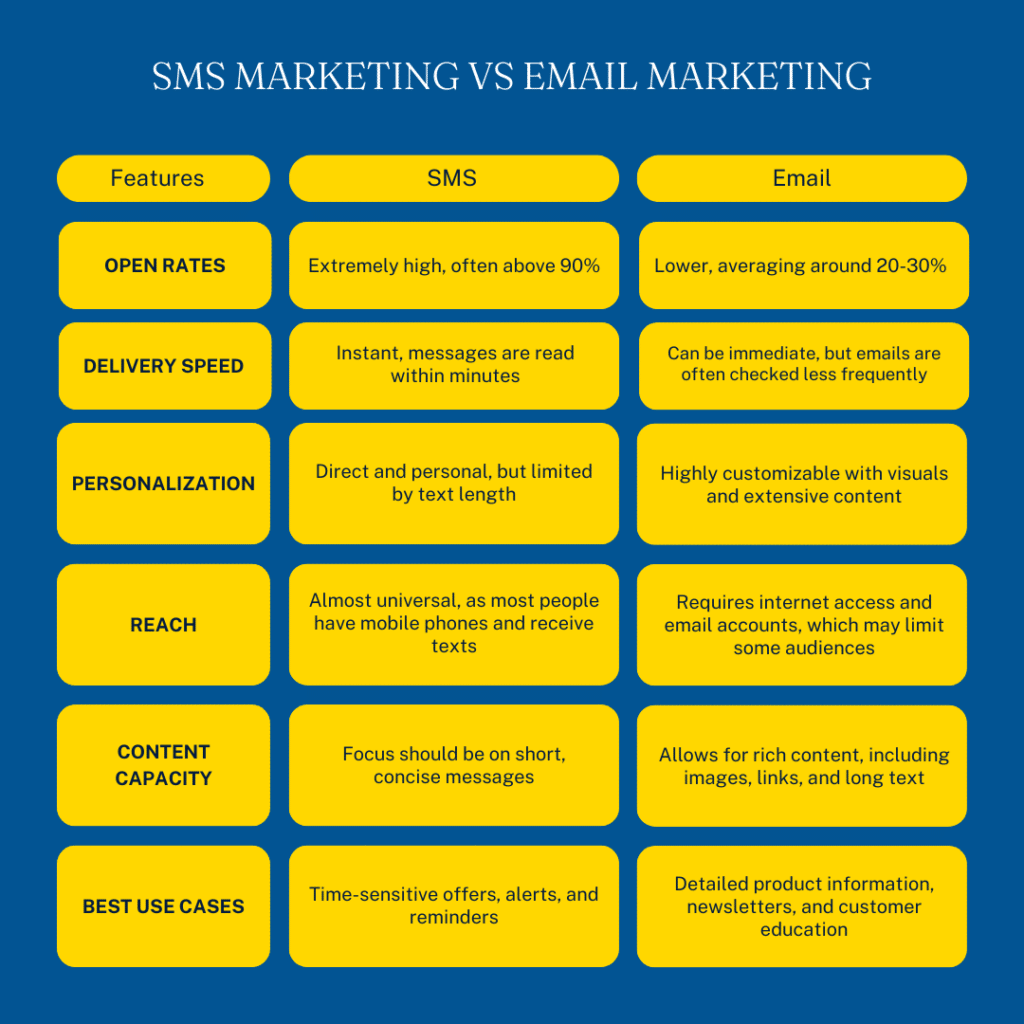
SMS Marketing vs. Email Marketing – Which is More Effective?
SMS and email marketing are important marketing channels for talking directly to customers.
SMS sends quick texts to phones, which is perfect for fast reminders, updates, or deals. On the other hand, emails are better for sending longer messages, like newsletters. Both strategies can be customized to fit your target audience, which helps you promote your business and build relationships.
But which option delivers better results?
In this article, we’ll compare SMS and email marketing. We’ll examine their pros and cons and see when they’re best used.

Get Started With Business Texting
View our pricing, and start your free trial with Textellent today!
SMS Marketing
What is SMS Marketing?
SMS marketing uses text messages to send promotions, updates, and alerts directly to people’s phones. It’s a quick way to get a message across without internet access. Plus, it instantly reaches people wherever they are.
SMS marketing campaigns are effective because they’re personal and direct, cutting through the noise to reach customers on their most used devices–mobile phones. An SMS message is short, so it’s crucial to get to the point quickly to engage customers without being invasive.
Advantages of SMS Marketing
High open and read rates compared to email
SMS messages are usually opened and read more than emails because people always have their phones handy and tend to check texts right away. More precisely, text messages have a 98% open rate, while emails have a 20-30% at best. In addition, research shows that 72% of consumers want to be able to text with businesses, and 40% indicate frustration when they can’t.
Immediate delivery and response
Because most people check their phones often, they tend to reply or take action fast. This quick back-and-forth helps businesses communicate important info or offers without delay.
Direct and personal engagement with customers
SMS feels personal because it lands directly in a customer’s text inbox, a place usually reserved for messages from friends and family. This direct line makes customers feel individually noticed and valued by a business.
Challenges of SMS Marketing
Shorter message lengths
The nature of text messages is that they are expected to be short, making it difficult to convey complex messages effectively. Many companies will include a picture to provide more details about a given product or service in order to keep the copy in a message short.
Possible higher costs and regulatory issues
SMS can be more expensive, and there are many rules to follow. Different places have strict laws about sending marketing texts, including needing permission from people before texting them. This keeps spam away but can make it tough to grow your audience quickly.
Need for opt-in from customers
Getting people to opt-in for texts in the first place also limits how many customers you can reach. You can’t just send marketing messages to anyone; they must agree to it first, so building a big list of contacts takes more effort.
Many businesses use advertising to ask prospects to “text-in” to receive special “text-only” offers. This can be a great strategy for building a text-based marketing list.
Alternatively, when a business is serving a customer, such as appointment reminders, project updates, etc., those types of messages do not require an opt-in.
Dealing with these issues means being smart about using SMS for marketing. You need to make every message count, watch your budget, follow the rules, and find good ways to get people to sign up.
Email Marketing
What is Email Marketing?
Email marketing lets you send emails to share news or products with customers. It offers deals and updates, keeping customers informed and close.
Advantages of Email Marketing
Ability to convey more detailed and rich content
Email marketing strategy allows for sharing more information in a single message. You can add pictures, links, and details that can help your audience better understand your product or service in one spot.
Lower cost at scale
Sending emails to many people doesn’t cost much, especially compared to traditional mail or even some digital advertising options. This makes it an affordable choice for businesses of all sizes, even those without a large budget.
Challenges of Email Marketing
Lower open rates compared to SMS
With inboxes getting flooded with various emails daily, it’s increasingly challenging for your message to stand out and be noticed by recipients. This competition for attention can significantly reduce the effectiveness of your email campaigns.
Risk of emails being marked as spam
Strict email spam filters, which protect users from unwanted messages, can mistakenly flag your legitimate marketing emails as spam. Once your emails are marked as spam, your open rates plummet, and your brand’s reputation can suffer as well.
More effort is required in designing and content creation
Designing visually appealing emails that perform well on different devices, creating compelling copy, and ensuring the overall message aligns with your marketing goals takes time and expertise. This process can be resource-intensive, especially for businesses without a dedicated email marketing team or those just starting.
Side-by-side Comparison of SMS vs Email Marketing

How to Choose the Right Strategy for Your Business
Text message marketing and email campaigns can create seamless communication with customers. When picking between SMS and email marketing, think about the following:
Who Your Customers Are
Different age groups might prefer texts or emails. Young people often like texts for quick updates, while older customers might prefer emails for more information. Consider how comfortable your audience is with technology.
Your Business Type
What you sell matters. Services like salons or clinics might use texts to promote new services or special offers, while stores could use emails to showcase products or sales and offer a link to purchase.
What You Want to Achieve
Texts work well if you need a fast response, like for a sale ending soon, because people read them quickly. If you’re trying to give a lot of information or keep in touch over time, emails can contain more details and visuals.
Is SMS Better than Email Marketing for Businesses?
When it comes down to it, SMS marketing outperforms email if you want quick, effective results.
Texts get opened and read almost immediately, so they’re ideal for time-sensitive messages like sales or reminders.
While email is useful for more detailed information, SMS is better for getting your audience’s attention quickly. Including a picture with an SMS message garners even more attention.
For businesses focused on instant impact, it’s the way to go, helping them connect with customers directly and quickly.
How to Integrate SMS Solutions in Your Marketing Strategies
Time-Sensitive Offers and Alerts
Quick SMS delivery can make a big difference for flash sales or urgent updates. An automated messaging solution like Textellent, which sends automatic messages, can save money and time.
This way, sending out quick SMS marketing messages can turn a quiet day into a busy one because people often read texts immediately.
Personalized Customer Service Messages
Offering support or updates through SMS can quickly address customer concerns or questions. This personal touch helps build stronger relationships, making customers feel valued and directly connected to your business.
Using an SMS business solution such as Textellent, which seamlessly integrates SMS into these strategies, can subtly enhance your engagement with your audience. Moreover, it ensures your messages are both seen and felt.
Best Practices for SMS and Email Marketing
Be Clear and Concise
You have limited space with SMS, so get straight to the point.
However, while you can say more in emails, your message should still be easy to read and understand. Start with the most important information.
Personalize Your Messages
Use the recipient’s name and tailor the message based on their interests or past interactions with your business. Personalization can increase engagement in both SMS and email.
Call to Action (CTA)
Make it clear what you want the recipient to do next, whether it’s visiting a website, redeeming an offer, or contacting your business. A strong, clear CTA is crucial.
Timing is Everything
Send messages when they’re likely to have the most impact. For SMS, this might mean avoiding early mornings or late nights. For email, consider the recipient’s time zone and typical email-checking habits.
Test and Learn
Regularly test different messages, CTAs and send times to see what works best. Use this data to refine your approach over time.
Business Texting at the Next Level With Textellent
SMS marketing is a game-changer for businesses looking to reach their customers directly and personally. With almost everyone having a mobile phone, texts are a surefire way to grab attention quickly.
Whether it’s for promoting a sale, sending reminders, or engaging in a two-way conversation, SMS marketing offers a direct line to your audience.
Why choose Textellent? The features are built for your success:
- Use shortcodes to provide easy opt-in opportunities
- Access ready-made templates and campaigns to hit the ground running.
- Leverage our strong API (via Zapier) to set up business rules that automate your workflow.
- Create multiple tags for events, client history, preferences, and stages in the customer journey.
- Enjoy the flexibility of sending bulk messages with the option to schedule them for the future.
Increase Your Marketing Impact with Textellent
Ready to boost your SMS marketing game? We see scheduling as a crucial part of a client’s journey. Let’s make every message matter!
Get started with a free trial or book a Demo consultation now to make your SMS marketing smarter and your client engagements stronger.
Conclusion
SMS and email marketing have unique strengths that can complement each other well in a balanced digital marketing strategy. While SMS offers immediacy and high engagement rates, email provides depth and detailed content. Together, they can cover a wide spectrum of communication needs.
Businesses should consider experimenting with email and text marketing to discover the perfect blend that meets their goals. Finding the right balance can enhance customer engagement, improve message reach, and ultimately contribute to the success of your marketing efforts.
FAQs About SMS Marketing vs Email Marketing
Can SMS marketing be used for all types of businesses?
Yes, SMS marketing can be effective for almost any business, especially those requiring timely communication with customers, such as retail, services, and hospitality industries.
How can I measure the success of my SMS and email marketing campaigns?
Keep an eye on open rates, clicks, sales, and how well your campaigns are doing. Both SMS and email have tools to help you track these metrics.
How do I avoid being marked as spam in email and SMS marketing?
Ensure your messages are relevant, your audience has opted in, and you respect their preferences and privacy. Regularly clean your list to remove inactive subscribers.
What’s the best time to send SMS and email messages?
Timing can vary based on your audience and the nature of your message. Generally, avoid early mornings or late nights for SMS, and test different email times to see what works best.





